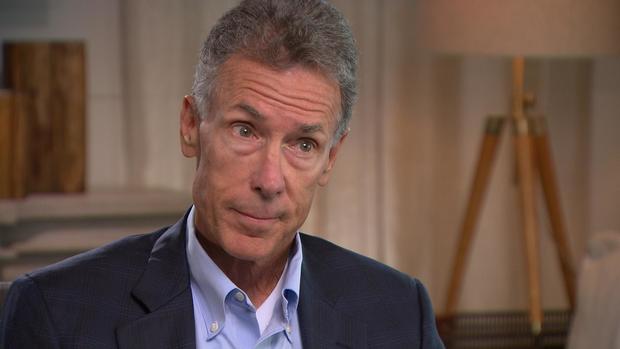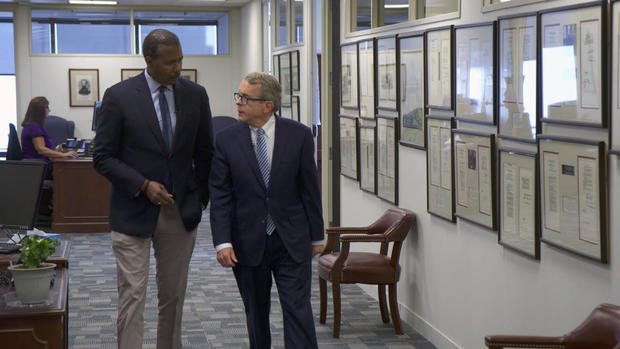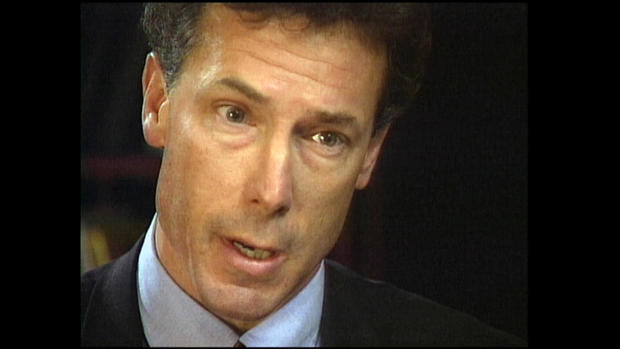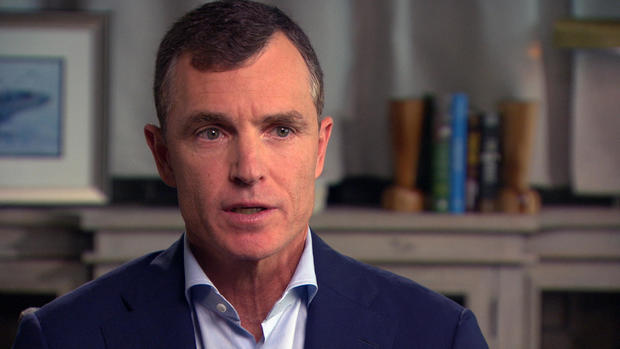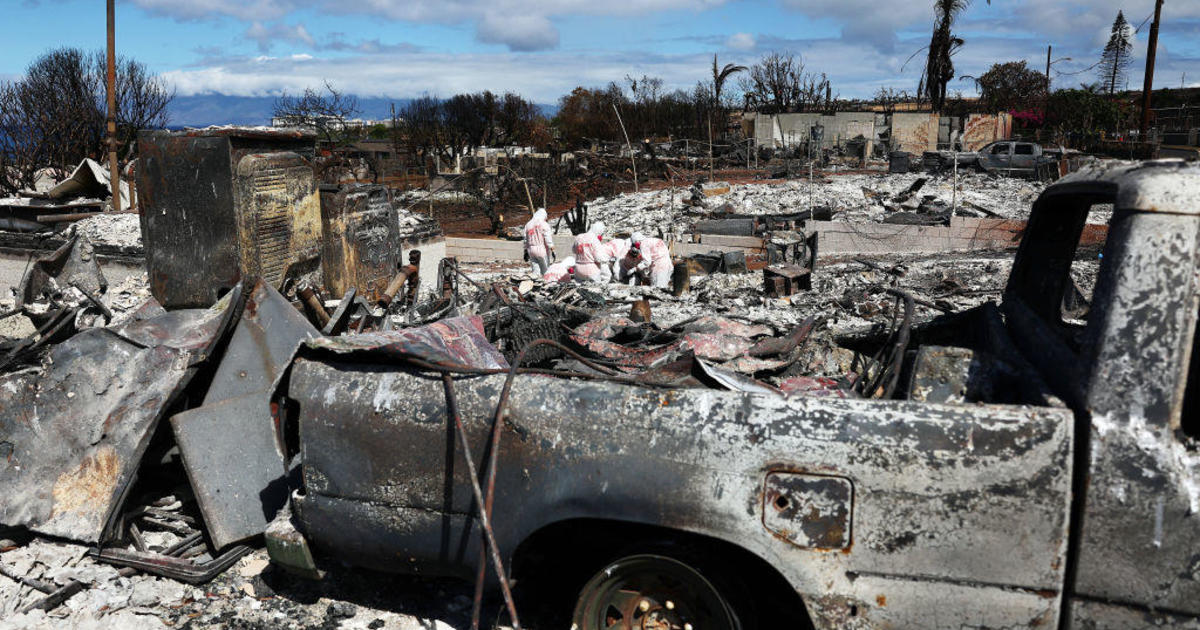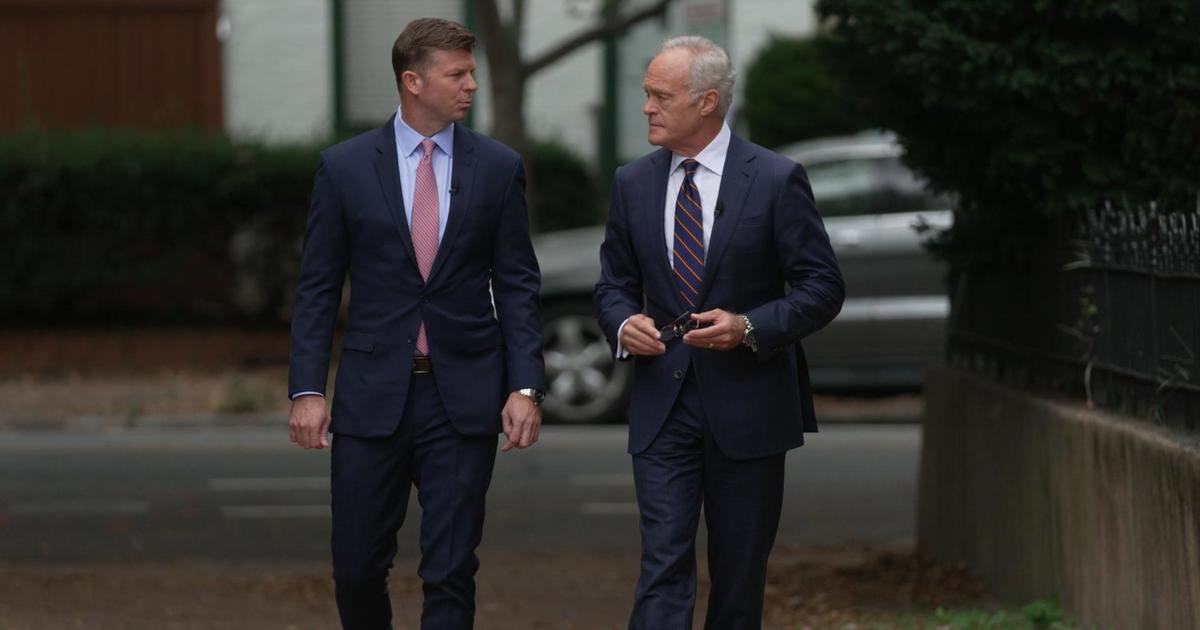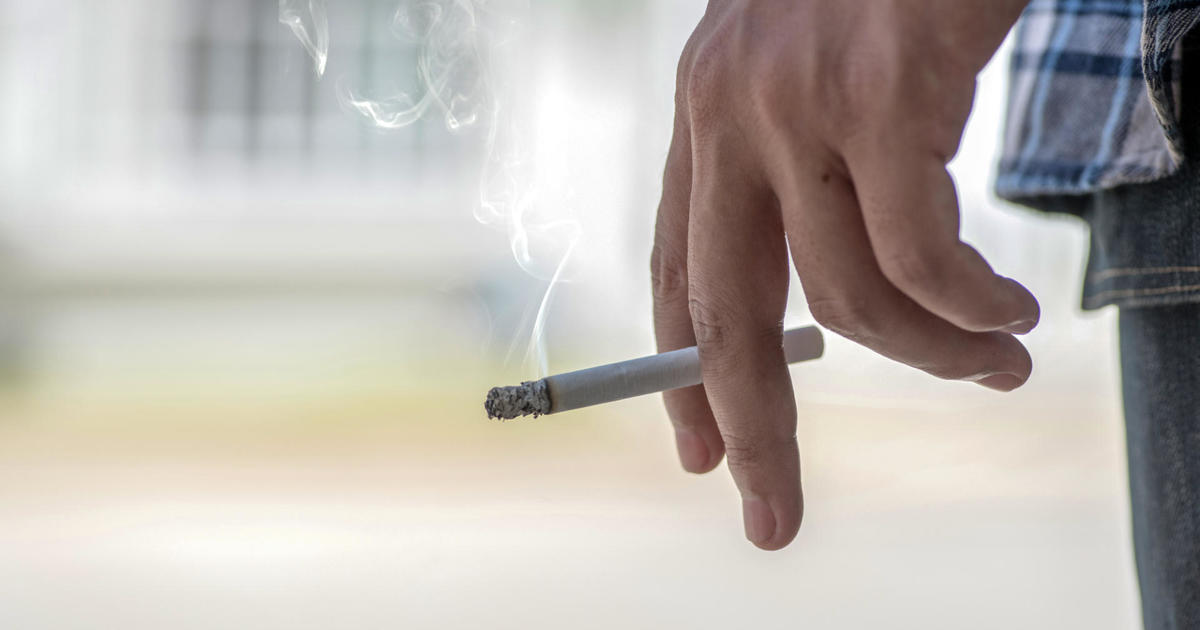Opioid Crisis: The lawsuits that could bankrupt manufacturers and distributors
Mike Moore says he's, "just a country lawyer from Mississippi." But this country lawyer has engineered two of the most lucrative legal settlements in American history. As Mississippi's attorney general, he engineered the historic 1998 settlement under which Big Tobacco paid billions to address smoking-related health issues. In 2015, he convinced BP to settle multibillion-dollar lawsuits over its huge oil spill in the Gulf of Mexico.
Now Mike Moore has taken aim at the manufacturers and distributors of opioid painkillers, claiming they should pay for the epidemic of addiction and death that has swept this nation. As you'll hear in a moment, he has powerful new evidence that he says proves that states like Ohio, among the hardest-hit by the opioid epidemic, should collect billions from all the companies he's suing.
Mike Moore: If we try the Ohio case, if we win a verdict against these manufacturers and distributors there, it could bankrupt them. It'd put them outta business.
Bill Whitaker: Truly? These are huge, profitable--
Mike Moore: Huge.
Bill Whitaker: --wealthy companies.
Mike Moore: Well, you know-- they can be as profitable as they want to. But-- Ohio is losing $4 billion or $5 billion a year from the opioid epidemic. And they're losing 5,000 or 6,000 people a year from overdose deaths. So when a jury hears the evidence in this case, they're not gonna award just a couple hundred million dollars. It may be $100 billion. And whoever amongst these companies thinks they can stand up to that? Good luck.
Attorney General Mike DeWine: We are hurting now in Ohio. We need help now in Ohio.
Ohio's Republican attorney general Mike DeWine, who will be sworn in next month as governor, hired Mike Moore as soon as he decided to file suit against opioid manufacturers and distributors.
Attorney General Mike DeWine: They flooded the State of Ohio with these opioid pills that they knew would kill people.
Bill Whitaker: They knew would kill people.
Attorney General Mike DeWine: If they didn't know it the first couple years, they clearly would've seen it after that. You can't miss it. When one year we had close to a billion-- a billion pain meds prescribed in the state of Ohio, you know, 69 per man, woman, and child in the state. And that lies at the feet of the drug companies. They're the ones who did that.
Ohio is one of four states Mike Moore formally represents, but he's coordinating with 30-plus states that have filed suit, and with many of the local governments, nearly 1,500 cities and counties that also are suing. He is the unofficial commanding officer of the army that's attacking the opioid industry.
Bill Whitaker: This is where your war room is located?
Mike Moore: That's right.
The unlikely "command center" for Moore's legal war is the sleepy town of Grayton Beach on Florida's panhandle.
Mike Moore: You know, in a place like this, you're not limited with a bunch of tall buildings, and coats and ties, and that kinda thing. You can think outside the box a little bit. So.
When we were in Grayton Beach, about a dozen lawyers from all around the country, some working on state cases, others on local lawsuits, had gathered for all-day strategy sessions, focused on an audacious goal.
Mike Moore: Success for me would be that we would find funding to provide treatment for all the 2.5 million opioid-dependent people in this country.
That would take many billions of dollars, of course, but remember, Mike Moore has done it before.
Mike Moore: Look, when I filed this tobacco case in 1994 there was nobody that thought that we had a chance to win. We showed up for our first hearing, and in our first hearing, so there was three of us there. On the courtroom on the other side they had 68 lawyers.
Despite that early mismatch, within four years Moore had all 50 states lined up against Big Tobacco. He did it partly by going to court, but mostly by going public.
Mike Moore: A case in court is a case in court, and that's fine. But there's also the court of public opinion. And the court of public opinion is sometime the most powerful court.
60 Minutes played an important and controversial role in the public case against Big Tobacco. Moore was interviewed for a segment that at first, CBS corporate lawyers refused to allow on the air.
Mike Moore: We're thinking to ourself, "Look, if 60 Minutes seems to be afraid of these guys for whatever reason, then what about us?" (LAUGH)
60 Minutes finally aired the segment in early 1996 after The Wall Street Journal ran a story featuring the same tobacco industry whistleblower.
Bill Whitaker: You said this in that 60 Minutes story, "This industry," talking about this-- the tobacco industry, "in my opinion is an industry…
Mike Moore in 1996: …who has perpetrated the biggest fraud on the American public in history. They have lied to the American public for years and years, they've killed millions and millions of people and made a profit on it."
Bill Whitaker: Those are pretty strong words.
Mike Moore: Well, it-- they were true. Those words were true.
Bill Whitaker: And you finally got big tobacco to cry uncle.
Mike Moore: That's right.
Bill Whitaker: They ended up paying, what, over $200 billion?
Mike Moore: $250 billion, yeah.
Bill Whitaker: So when you look back on what you did what has been the impact?
Mike Moore: We reduced smoking rates to a place that nobody ever thought was possible. So the number one cause of death in America has been reduced dramatically. That's pretty powerful.
"The distributors are saying things like, 'We're just truck drivers. We didn't know where the pills went.' Of course, they did"
Now, going after the opioid industry, Mike Moore is using the same playbook he used against tobacco and more recently against BP for the Gulf Oil Spill: build legal and public pressure until the companies see no choice but to settle, and fork over billions.
Mike Moore: Here's the deal. There's a huge pill spill in this country. It's huge.
Bill Whitaker: Pill spill?
Mike Moore: Pill spill. Huge pill spill. It never should've occurred. Everybody's got some fault. But we have 72,000 people dying every year. Let's figure out a way to resolve this thing. You guys made billions of dollars off of this. Take some of that money and apply it to the problem that you helped cause.
He's a long way from convincing the drug industry to do that, of course, that's why all the lawsuits. The first targets are opioid manufacturers like Purdue Pharma, which makes oxycontin, the pill that fueled the opioid epidemic.
Mike Moore: Purdue Pharma created an environment so that opioid use was okay. So if you prescribe your patients this drug, there's less than 1 percent chance they'll get addicted. That was a lie, a big lie.
Bill Whitaker: Can you prove that in court?
Mike Moore: Absolutely.
Purdue Pharma declined our request for an interview, but said in a statement that when the FDA approved oxycontin in 1995 it authorized the company to state on the label that "addiction to opioids legitimately used is very rare." But as evidence of abuse mounted, the company admitted in federal court in 2007 that it had misled doctors and consumers about just how addictive oxycontin can be.
Mike Moore: The Purdue Pharma case is an easy case. I hate to say it, but it's an easy case to prove. You can prove that they told the lies that they told.
It has been considered tougher to build a case against Mike Moore's other targets, the huge drug distributors who've made billions delivering opioids from manufacturers to pharmacies.
Mike Moore: The distributors are saying things like, "We're just truck drivers. We didn't know where the pills went." Of course, they did. There's a Controlled Substance Act. Controlled Substance Act. You're supposed to control these pills. And when you don't, you have a responsibility for it. It-- it's real simple.
"The stories that you've heard from some of the DEA investigative agents concerning the large volumes of pills going into certain parts of our country are absolutely true."
It's also simple why Moore is going after the biggest players in drug distribution: because they have much deeper pockets than the manufacturers. Purdue Pharma, for example, had less than $2 billion in revenue last year. Distributor McKesson, by contrast, had $208 billion in revenue.
Mike Moore: McKesson, you're the sixth largest company in this country. You're telling the American public you didn't have systems in place to adhere to the Controlled Substance Act? Seriously?
Mike Moore and his allies now have what they characterize as devastating evidence proving that distributors knew what they were doing. A huge confidential DEA database called ARCOS tracks all transactions involving controlled substances. This spring, a federal judge in Cleveland who is hearing many of the local lawsuits ordered all that data to be handed over to the plaintiffs' lawyers.
Burton LeBlanc: And I can actually tell you which distributor distributed to which particular pharmacy, by year, by volume, and where the pills came from.
Burton LeBlanc is a Louisiana lawyer who regularly huddles with Mike Moore in Grayton Beach. His firm represents hundreds of cities and counties in their opioid lawsuits, and his team has taken the lead in analyzing the ARCOS data.
Burton LeBlanc: In terms of the wholesale distributor's duty to report suspicious orders, we can immediately look at volume and detect patterns with the data that we currently have.
Bill Whitaker: So, you can see that for every pharmacy in the-- in the country?
Burton LeBlanc: I have it for every transaction in the United States.
Bill Whitaker: What's the most important thing that it has shown you?
Burton LeBlanc: That the stories that you've heard from some of the DEA investigative agents concerning the large volumes of pills going into certain parts of our country are absolutely true.
One of those stories concerned Kermit, West Virginia, a town of just 400 people, where nine million opioid pills were delivered in just two years to a single pharmacy.
Bill Whitaker: Did the companies have access to this information?
Burton LeBlanc: It was their data.
That data has now been shared with state attorneys general, including Ohio's Mike DeWine.
Attorney General Mike DeWine: I'm not allowed to talk about the specifics. But I will simply tell you it's shocking. Anyone who was looking at those numbers, as those middlemen were, as these distributors were, clearly, clearly should've seen that something was dramatically wrong.
"If they cared enough, maybe we would not have lost 500,000 lives from this problem."
Like Purdue, drug distributors declined our request for an interview, but in a statement from their trade association, said, "it defies common sense to single out distributors for the opioid crisis… distributors deliver medicines prescribed by a licensed physician and ordered by a licensed pharmacy." But Mike Moore insists that does not let the companies off the legal hook.
Mike Moore: If you've got walking around sense and you care, you're gonna check before you send nine million pills to a little, bitty county in West Virginia or Mississippi or Louisiana or Ohio. You're gonna check if you care.
Bill Whitaker: You think they don't care?
Mike Moore: I don't think they cared enough. And if they cared enough, maybe we would not have lost 500,000 lives from this problem. It's-- it just-- it appalls me.
Trial dates have been set for next year in a few of the state and local cases. But rather than go to trial, and just as he did with tobacco, Mike Moore hopes to force a mega-settlement to fund drug treatment, prevention, and education.
Bill Whitaker: You had to have thought about how much money you would need to do the projects that you foresee?
Mike Moore: Oh, I've seen all the models. To be effective, we need at least $100 billion to start off with.
Bill Whitaker: And I know you've heard the criticism, that with all these lawyers involved, that this is just a bunch of trial lawyers looking for a great, big payday.
Mike Moore: Right. I don't care one whit about any money in this case. Not one whit whatsoever about it.
Bill Whitaker: Nobody's gonna believe that the attorneys are not going to make any money.
Mike Moore: No, no, no. No, no, and I'm not saying that. I was talking about-- all I can speak for is me.
Bill Whitaker: You made money off tobacco.
Mike Moore: Nope, not a penny.
That's because for all the years of the tobacco litigation, and many years after, Moore was working for a modest state salary as Mississippi attorney general.
Bill Whitaker: You made money off of BP spill.
Mike Moore: I made some money on helping resolve the case, yeah.
Moore has made enough money to be comfortable. At age 66, this may be his last big case, and he believes the ARCOS data gives him the ammunition he needs to demolish the opioid industry's argument that it should not be blamed.
Mike Moore: Nobody in the world's gonna believe that. And-- and don't go try to tell that to 12 jurors in Mississippi or Ohio who've lost people from this. You know what-- (LAUGH) you know what those jurors are gonna do? They're gonna go in the back room, they're gonna spend about 30 minutes thinking about it, gonna come back out and bam.
Produced by Rome Hartman. Associate producer, Sara Kuzmarov.
